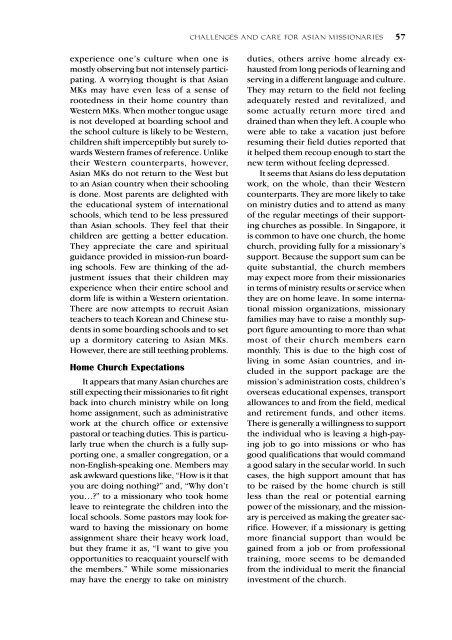Part 2 Regional Issues and Insights - World Evangelical Alliance
Part 2 Regional Issues and Insights - World Evangelical Alliance
Part 2 Regional Issues and Insights - World Evangelical Alliance
Create successful ePaper yourself
Turn your PDF publications into a flip-book with our unique Google optimized e-Paper software.
challenges <strong>and</strong> care for asian missionaries 57<br />
experience one’s culture when one is<br />
mostly observing but not intensely participating.<br />
A worrying thought is that Asian<br />
MKs may have even less of a sense of<br />
rootedness in their home country than<br />
Western MKs. When mother tongue usage<br />
is not developed at boarding school <strong>and</strong><br />
the school culture is likely to be Western,<br />
children shift imperceptibly but surely towards<br />
Western frames of reference. Unlike<br />
their Western counterparts, however,<br />
Asian MKs do not return to the West but<br />
to an Asian country when their schooling<br />
is done. Most parents are delighted with<br />
the educational system of international<br />
schools, which tend to be less pressured<br />
than Asian schools. They feel that their<br />
children are getting a better education.<br />
They appreciate the care <strong>and</strong> spiritual<br />
guidance provided in mission-run boarding<br />
schools. Few are thinking of the adjustment<br />
issues that their children may<br />
experience when their entire school <strong>and</strong><br />
dorm life is within a Western orientation.<br />
There are now attempts to recruit Asian<br />
teachers to teach Korean <strong>and</strong> Chinese students<br />
in some boarding schools <strong>and</strong> to set<br />
up a dormitory catering to Asian MKs.<br />
However, there are still teething problems.<br />
Home Church Expectations<br />
It appears that many Asian churches are<br />
still expecting their missionaries to fit right<br />
back into church ministry while on long<br />
home assignment, such as administrative<br />
work at the church office or extensive<br />
pastoral or teaching duties. This is particularly<br />
true when the church is a fully supporting<br />
one, a smaller congregation, or a<br />
non-English-speaking one. Members may<br />
ask awkward questions like, “How is it that<br />
you are doing nothing?” <strong>and</strong>, “Why don’t<br />
you…?” to a missionary who took home<br />
leave to reintegrate the children into the<br />
local schools. Some pastors may look forward<br />
to having the missionary on home<br />
assignment share their heavy work load,<br />
but they frame it as, “I want to give you<br />
opportunities to reacquaint yourself with<br />
the members.” While some missionaries<br />
may have the energy to take on ministry<br />
duties, others arrive home already exhausted<br />
from long periods of learning <strong>and</strong><br />
serving in a different language <strong>and</strong> culture.<br />
They may return to the field not feeling<br />
adequately rested <strong>and</strong> revitalized, <strong>and</strong><br />
some actually return more tired <strong>and</strong><br />
drained than when they left. A couple who<br />
were able to take a vacation just before<br />
resuming their field duties reported that<br />
it helped them recoup enough to start the<br />
new term without feeling depressed.<br />
It seems that Asians do less deputation<br />
work, on the whole, than their Western<br />
counterparts. They are more likely to take<br />
on ministry duties <strong>and</strong> to attend as many<br />
of the regular meetings of their supporting<br />
churches as possible. In Singapore, it<br />
is common to have one church, the home<br />
church, providing fully for a missionary’s<br />
support. Because the support sum can be<br />
quite substantial, the church members<br />
may expect more from their missionaries<br />
in terms of ministry results or service when<br />
they are on home leave. In some international<br />
mission organizations, missionary<br />
families may have to raise a monthly support<br />
figure amounting to more than what<br />
most of their church members earn<br />
monthly. This is due to the high cost of<br />
living in some Asian countries, <strong>and</strong> included<br />
in the support package are the<br />
mission’s administration costs, children’s<br />
overseas educational expenses, transport<br />
allowances to <strong>and</strong> from the field, medical<br />
<strong>and</strong> retirement funds, <strong>and</strong> other items.<br />
There is generally a willingness to support<br />
the individual who is leaving a high-paying<br />
job to go into missions or who has<br />
good qualifications that would comm<strong>and</strong><br />
a good salary in the secular world. In such<br />
cases, the high support amount that has<br />
to be raised by the home church is still<br />
less than the real or potential earning<br />
power of the missionary, <strong>and</strong> the missionary<br />
is perceived as making the greater sacrifice.<br />
However, if a missionary is getting<br />
more financial support than would be<br />
gained from a job or from professional<br />
training, more seems to be dem<strong>and</strong>ed<br />
from the individual to merit the financial<br />
investment of the church.
















